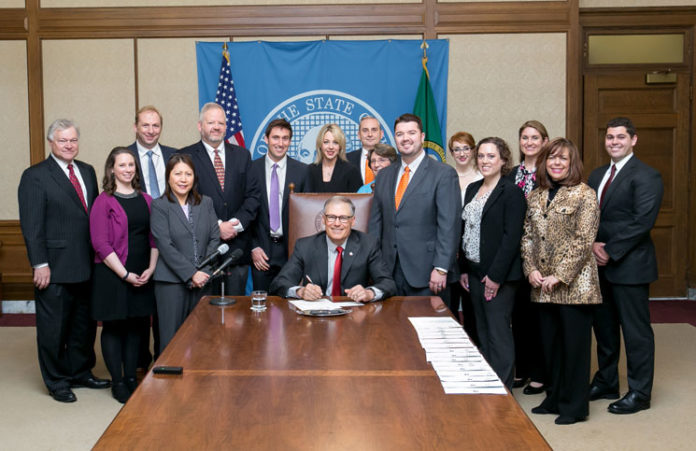Small businesses in Washington state may find it easier to obtain the funding they need to move ideas and projects forward, thanks to new legislation that expands on the state’s crowdfunding law and increases access to capital for small business.
Gov. Jay Inslee recently signed Rep. Brandon Vick’s HB 1593, which goes into effect July 22. Remarkably succinct – only four pages long – the bill enjoyed bipartisan support, with zero nay votes in the House or Senate. The bill is aimed at “small securities offerings” (aka crowdfunding), whereby businesses fund a project or venture by raising monetary contributions from a large number of people, typically via the internet.
Changes that the bill introduces include reducing the frequency of having to file a business’s executive salary information from quarterly to annually; removing the investment limitations of accredited investors; and extending the allowable types of funding to include convertible debt and any type of equity funding.
According to popular crowdfunding site Kickstarter, businesses around the world have raised a total of more than $3 billion for 123,631 projects, with nearly 13 million backers. Even with the “old” rules, many local businesses have used crowdfunding to bankroll their projects. Examples include Bluer Denim (founded by Jeff Shafer, who also is the founder of Ridgefield-based Agave Denim), OurBar and Doomsday Brewing in Washougal, and the Kiggins Theatre and manufacturer ProtoPlant, Inc. in Vancouver. More recently, VBJ Business Growth Award winner Plum Geek Robotics raised nearly $400,000 in the last two years.
Rep. Vick (R-Felida) hopes the bill will extend this type of success to more Washington businesses (including those incorporated in other states), benefitting businesses but still protecting investors.
“We need to continue to look for new, innovative ways for businesses and startup companies to invest and raise capital,” said Vick.
Mike Bomar, president of the Columbia River Economic Development Council, said that there is a variety of funding options – banks, angel funding and venture capital, for example. The trick is to find the option that makes the most sense for a particular company.
“This bill will expand the overall portfolio of funding options for businesses of all sizes,” said Bomar.
Loren Lyon is president of Impact Washington – a nonprofit organization specializing in manufacturing consulting services – as well as president of a large angel investment group. Lyon said he generally favors the bill, though he is concerned that expanding the allowable types of funding may confuse the average investor. He also cautioned that crowdfunding is just that – funding. Companies don’t get the benefit of the sage advice and business networking that typically accompanies angel investing.
Despite the possible pitfalls, Lyon sees crowdfunding as a viable way to fill the gap between family-and-friends funding (generally limited to a few thousand dollars) and angel investors (who can provide large sums of money but generally require proven performance with a clearly defined market). He said his angel investment group sees 60 to 70 funding applications every month, out of which two or three actually get funding. Many of the remainder, said Lyon, have really good ideas and crowdfunding can help those businesses get off the ground.
TechNet.org is one of several organizations that testified in favor of the bill when the House was considering it. TechNet is a national, bipartisan network of technology CEOs and senior executives that promotes the growth of the innovation economy. TechNet’s Joanie Deutsch, executive director, Washington and the Northwest, said that innovative, high-growth companies face many challenges, and require access to capital and markets.
“HB 1593 simplifies and streamlines Washington’s crowdfunding statute, which encourages the development of entrepreneurship,” said Deutsch.
Pick your platform
Businesses can choose between several options when pursuing crowdfunding.
Business-focused:
Kickstarter – the world’s largest funding platform for creative projects
Fundable – targeted to start-ups
Indiegogo – another international crowdfunding platform
CrowdFunder – social enterprises, small businesses and tech startups
KarmaKrowd – intellectual property protection focus
Nonprofit, charity and personal fundraising:
GoFundMe – ask friends and family to help fund major life events
PocketCause.org – crowdfunding for nonprofits
RedBasket.org – charitable fundraising
CrowdRise – personal causes
RaisingKarma – personal and community projects
Real estate crowdfunding:
RealtyShares – vetted real estate investments
FundRise – raise money to redevelop storefronts and incubate local businesses
RealtyMogul – commercial real estate investing
PeerStreet – investment marketplace for real estate debt
And more… Teespring, Patreon, Kiva, YouCaring, DonorsChoose, GiveForward…




